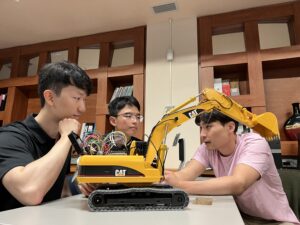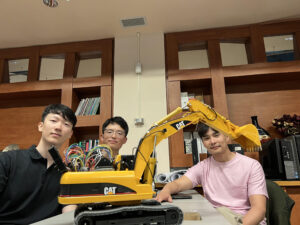Undergrad summer student research positions explored
The following is part of a series introducing CivMin’s undergraduate summer students to the Department and our greater community.
We explore the students’ projects, motivation and challenges, while providing insights into who they are, and what motivates them, beyond academia. It also highlights the multitude of ways summer research opportunities are approached and implemented under the guidance of our industry-leading CivMin professors.

In the course Introduction to Civil Engineering (CIV201), Terry Liang (CivE, Year 3) and Ollie Zhao (CivE, Year 3) had the opportunity to tour campus and visit various professors and research groups. This is when they first learned about Professor Daeho Kim‘s research and knew it was an avenue they wanted to pursue. Prof. Kim ended up being Terry and Ollie’s construction management professor, providing plenty of opportunity for inquiry about potential research opportunities. This summer, Terry and Ollie will be exploring the world of construction management and AI, under the supervision of Prof. Kim.
Tell us a bit about yourself.
Terry Liang: My name is Tianyu Liang. You can call me Terry. I’m a second-year Civil Engineering student, starting my third year this September. Prof. Kim was my professor in second year. [Ollie and I] have been working with him since the beginning of May [2023]. Our summer research is about deep neural network-powered artificial intelligence for construction applications.
Ollie Zhao: I’m a second-year Civil Engineering student, going into my third year [this September]. I’ve been working with Prof. Kim since the start of May [2023].
What will be your role this summer and where? What types of tasks and work will you be doing? And what is the research goal?
Terry: We’re learning Python, doing machine learning courses online and trying to become more familiar with the software we’ll need to support the future steps of our research. For now, we are following instructions from Prof. Kim and Ali Tohidifar [PhD candidate] and trying to learn more about the Blender software specifically. I hope we can help more in the future.
Ollie: To start, we need to [familiarize ourselves] with the various AI systems – the software part of it. We’re learning about Python and trying to get into machine learning. Right now, we‘re working on Blender, which is a 3D rendering software. We’re trying to simulate construction sites in it using Python code. We’re also helping a lot with other students’ research projects. For example, we’re helping Ali label some images and maps. Later [in the summer], we’re going to get more into data generation.
AI on a construction site. It‘s fascinating.
What motivated you to work with Prof. Kim on this project?
Terry: We were in Introduction to Civil Engineering – CIV201 and Ali and [PhD candidate] Sheida Saffari were demonstrating some cool research. Sheida was working on a robotic excavator and Ali was showing us simulations using AI in construction. Afterwards, [Ollie and I] chatted about how interesting it was. It was something we needed to dive into; we needed to talk to this professor. Luckily, Prof. Kim was also our construction management professor, so we got many opportunities to speak with him.
Ollie: For me, it was the start of second year. We had a course, [Introduction to Civil Engineering – CIV201], where we went around the campus and visited various professors and research groups. When I saw Prof. Kim’s research project, I thought, that‘s amazing – AI on a construction site. It‘s fascinating. I knew I had to get involved.
What do you foresee being the greatest challenge?
Terry: Sometimes, we encounter technical difficulties, but we always have each other to talk to and try to find solutions. If we can’t solve the problem, we can always email Ali for help. Every Friday, we also have a meeting altogether and [discuss] everything we think is a challenge – we talk with Ali, we talk with Prof. Kim and we figure out the solution together. So far, we haven’t had any signficant challenges.
Ollie: In terms of technical challenges, it’s more or less human error. If you can’t figure it out on your own, you talk to Prof. Kim or Ali, and everything eventually gets solved. I’m expecting a lot of [technical challenges] in the future but so far, it’s been fairly smooth.
Have you found any favourite spots on campus?
Terry: We play a lot of ping pong with each other [on campus].
Ollie: Pharmaceutical building [Leslie L. Dan Pharmacy Building], on the basement level – there’s a ping pong table there.
Is there anything I haven’t asked you about that you’d like to speak on? Final thoughts?
Terry: Before, when I thought about summer research, I didn’t have a clear image of what it looked like. I thought, maybe we will be given a task to work on the whole summer, maybe we will have a partner, like Ollie. After talking about summer research with Prof. Kim, he gave us many useful suggestions, such as courses. They’re helpful, and we are working on them now. I didn’t expect the good clear instructions we’ve received from Prof. Kim but we’re very happy to be receiving them.
Ollie: The research program is much more educational and interesting than what I initially thought it was going to be. A couple of years back, I would’ve thought – summer research [involves] helping out with some manual tasks, learning some software here and there and that was about it. Having worked with Prof. Kim, [I now know] it’s much more educational. Before, when I was looking at AI stuff, I didn’t know where to find information. Then, Prof. Kim said: here are five specializations and here are courses in Coursera. They’re very educational, build a much more solid foundation and cover all areas I wouldn’t have seen otherwise. That’s just a [minor] example within this research opportunity that’s very educational.
Do you have any interesting hobbies or fun facts about yourself you’d like to share?
Terry: I have a piano at my place and sometimes I teach Ollie piano.
Ollie: [Terry and I] recently bought a little Costco boat and we’re looking to go fishing on the weekends for some carp and bass. We also got a bow and arrow to shoot in the water; it’s legal. Hopefully, we don’t sink our own boat; it’s inflatable.
Questions for Prof. Kim:
What do you hope for Terry and Ollie to achieve this summer? Takeaways?
Prof. Kim: There’s just one thing I hope for [Ollie and Terry] to learn this summer – it’s all about fun. It’s their first year of research. In terms of research value and perspective, the summer is too short for [Terry and Ollie] to have a profound contribution. And the research topic we are doing is not an easy one; few construction researchers can [tackle this one]. We also just started this area of research in 2016 – I was one of the first PhD students to work in this area.
For Terry and Ollie, this is a great opportunity to get a taste of research. For me, I feel a great responsibility as a supervisor in our department. I can motivate undergraduate students and spark more positive thoughts about future research. I also want to prove we can have fun with research. Next year, we will have a different story.
Such things cannot be replaced by AI; they should be done by human resources.
How will Terry and Ollie be contributing to this project/your research?
Prof. Kim: [Terry and Ollie’s] contribution this summer is significant. Our research at this stage requires manual input, manual investigation and manual repetitive experiments with changing parameters. Such things cannot be replaced by AI; they should be done by human resources. Ollie and Terry are taking much of this task on and doing very well. They’ve also suggested a new idea. A few weeks ago, I accepted this idea and we’re working on that too.
Is there anything I haven’t asked you about that you’d like to speak on? Final thoughts?
Prof. Kim: Our research is multidisciplinary which requires knowledge about construction management but also knowledge about virtualization, digitalization and computer science, including computer vision, like low-bias artificial intelligence. To conduct our research, usually it takes a lot of time for students to catch up because [a wide breadth] of knowledge and skills is needed. We also need to deal with many different types of software and the Python-based deep neural network training platform. That’s why I love to start with undergraduate students.
Ollie and Terry were two of the top students in my course last year. They’re also thinking about applying to a graduate program after they graduate. It will take a lot of time to prepare them to conduct this research. If they can start their learning and training during their undergraduate, it will better match the research schedule [for this project and their continued education]. That’s why I love this program. I plan to support their research until their graduation; we will continue our collaboration.
